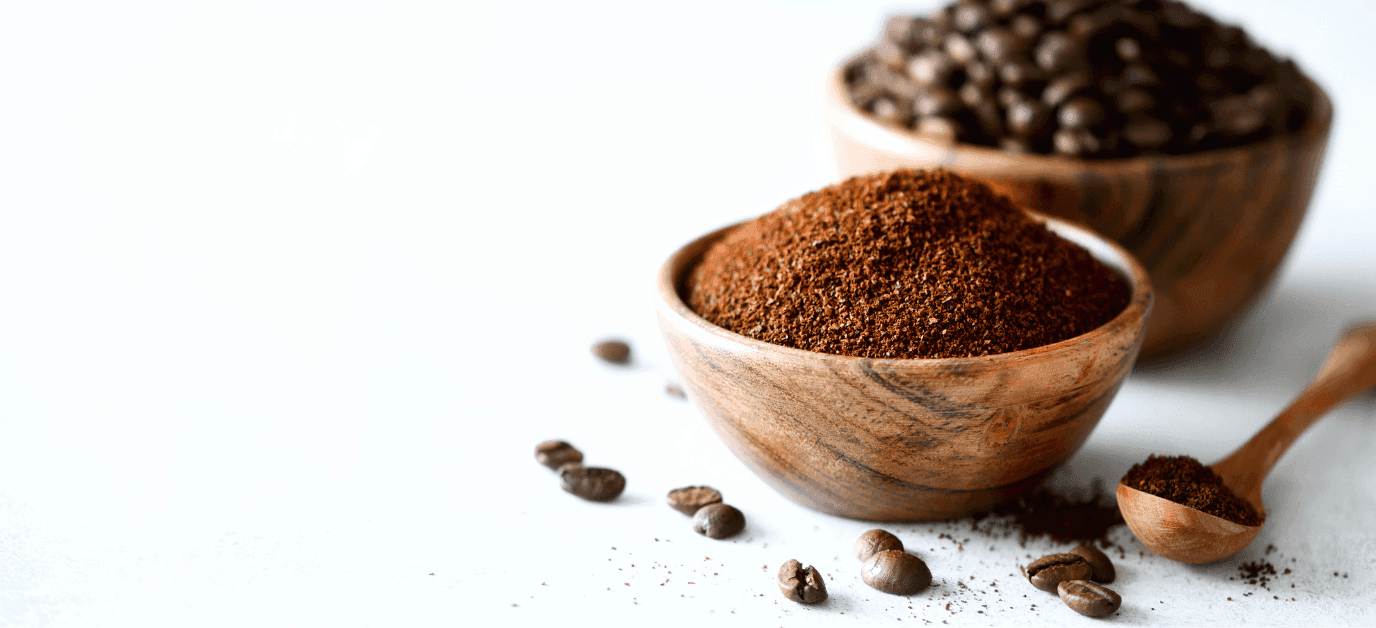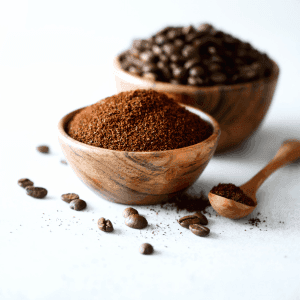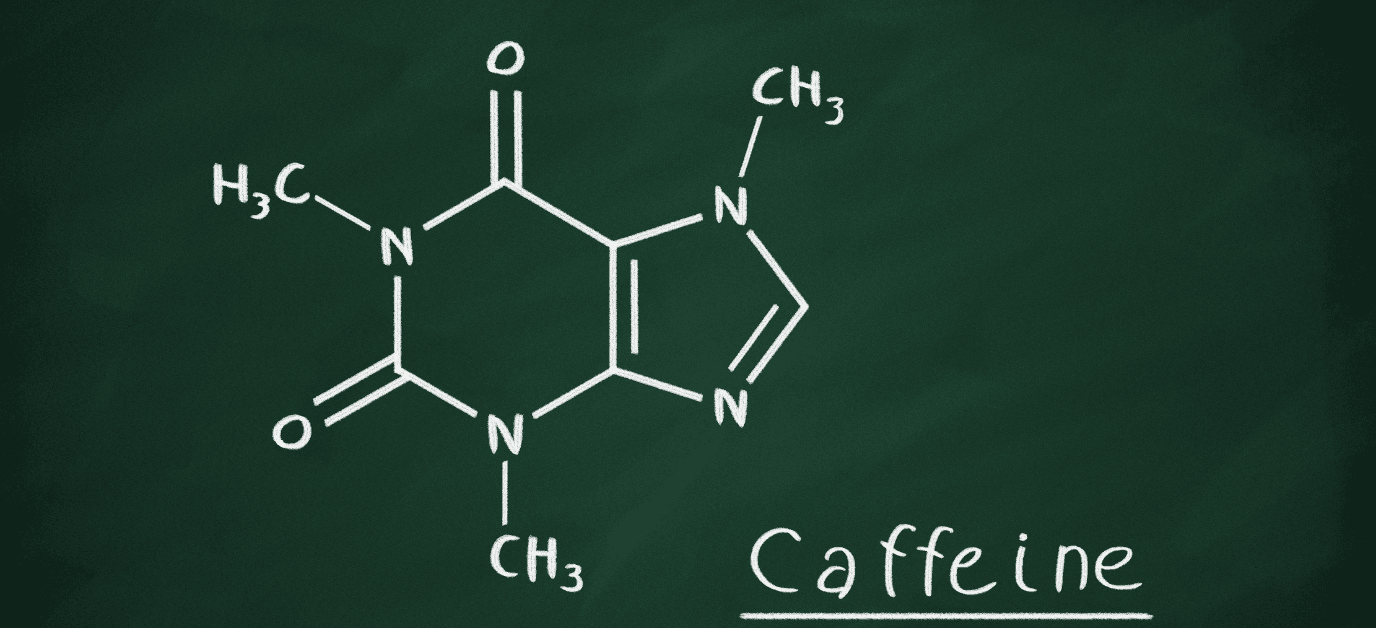

Caffeine: A Natural Stimulant and Its Effects on the Body
08.01.2025Caffeine comes to the rescue when you lack energy during training or want to push for a personal best. It's also helpful when you have a lot of work or studying ahead, or need an extra boost after a sleepless night. However, these are not the only benefits of using caffeine. Regardless of whether you consume it in the form of your favorite coffee or a pre-workout supplement, it offers much more than just an "energy kick."
Caffeine: A natural dose of energy
Caffeine is an organic chemical compound obtained from over 60 plant species, including coffee beans, cocoa, and tea leaves, but it can also be obtained through chemical synthesis [1]. Caffeine is a natural stimulant and acts by stimulating the brain and central nervous system (CNS), helping to maintain alertness and prevent fatigue [2].

Caffeine vs. caffeine anhydrous
Caffeine is a compound found naturally occurring in coffee and tea leaves. Caffeine anhydrous, on the other hand, is a highly concentrated form of caffeine. It is obtained in laboratories by removing water molecules from the molecule. It forms a white, crystalline powder with a concentrated caffeine content [3]. Caffeine anhydrous is added to, among other things, medications, dietary supplements, and energy drinks, because such processing allows manufacturers to more precisely determine its doses in the product.
One compound, several names
Caffeine is also known as theine - from tea, mateine - from yerba mate, and guaranine - from guarana. Chemically, it is the same substance, differing only in its source [4].
How does caffeine work?
After consumption, caffeine is rapidly absorbed from the intestines into the bloodstream, and peak concentrations are reached after 30-120 minutes [1]. From there, it travels to the liver and is broken down into compounds that can affect the functioning of various organs, but the main effect of caffeine is on the brain [5].
Caffeine works by blocking the action of adenosine, a neurotransmitter that has an inhibitory effect on the CNS - it "relaxes" the brain and causes feelings of fatigue [5]. During the day, adenosine levels rise, and caffeine helps to stay alert by binding to adenosine receptors in the brain without activating them. In addition, caffeine can raise blood adrenaline levels and increase the activity of dopamine and norepinephrine [2].
Did you know that...
Caffeine from one cup of coffee can enter the bloodstream in as little as 20 minutes? [6]

How does caffeine affect the body?
Scientific research suggests that caffeine may affect:
Cognitive functions
Caffeine helps not only athletes - it can also be helpful for mental work. Thanks to caffeine, concentration, memory, reaction time, and attention increase, and drowsiness and mental fatigue decrease [6-8]. Importantly, it can improve cognitive function even after a sleepless night [9] - however, it should be remembered that it is not possible to suppress fatigue in the long run.
In 2017, an extensive review of 25 studies by the US Institute of Medicine was published [10]. The work concerned the use of caffeine among 653 participants during prolonged military operations. The results suggest a beneficial effect of caffeine consumption on cognitive function in sleep-deprived individuals. Participants experienced improved attention and alertness, reaction time, problem-solving, and reasoning.

Energy levels and stimulation
Caffeine has a stimulating effect on the body and can delay fatigue, which is why it is a popular ingredient in so-called pre-workouts. Caffeine can improve subjective assessment of exertion, and improve aerobic endurance, anaerobic capacity, sprint speed, muscle endurance, muscle strength, and agility. These effects occur in many different sports [1,11-13].
Metabolism and fat burning
Caffeine can be helpful in weight loss because it potentially:
* speeds up metabolism (by up to 11%),
* accelerates fat burning (by up to 13%),
* affects the increase in resting metabolic rate,
* increases energy expenditure by about 100 kcal per day.
Using caffeine alone for weight loss is a poor strategy (e.g., in popular fat burners). It accounts for a fraction of the several components of weight loss - the most important is a calorie deficit in the diet, so it is best to treat it as an adjunct in this process.

Mood and motivation
An extensive review of scientific research from 2016 suggests that moderate caffeine consumption may have a positive effect on mood and motivation [14]. During exercise, adenosine is released in the body, which affects a decrease in the release of dopamine - the so-called "reward hormone" [14,15]. Taking caffeine before or during exercise maintains dopamine release, potentially maintaining mood and motivation for further hard work.
Prevention of some diseases
Scientific research suggests that regular coffee drinking (100-400 mg caffeine/day) may reduce the risk of: [16-19]
* heart disease by 16-18%,
* heart attack by 20%,
* type 2 diabetes by 30%,
* gout by 40% in men and 57% in women.
In addition, consuming 3 cups of coffee a day for just 3 weeks can increase the amount and activity of beneficial gut bacteria [20].
How much caffeine per day?
The safe dose of caffeine for an adult is up to 400 mg per day. Based on current scientific research, it can be concluded that a safe and well-tolerated daily dose is 3 mg/kg body weight [21].

Caffeine use before training
To experience the benefits of using caffeine during training, it is worth consuming it 30-60 minutes before starting exercise. The portion should be adjusted to your preferences and feelings. It is recommended to start with 100 mg/200 mg and observe the body's reaction. It is not worth "throwing yourself" immediately at the popular 400 mg - especially if you don't drink coffee every day and have never used a product with pure caffeine. Instead of enjoying the workout, you may feel unwell (headache, nausea), and even experience anxiety. Focus on the quality of caffeine, not the quantity - and remember, caffeine won't do the workout for you.
Regular intake of high doses of caffeine can lead to changes at the chemical level in the brain - brain cells may produce more adenosine to compensate for those blocked by caffeine [22]. So to continue to achieve stimulation, you need to take more caffeine. This leads to "tolerance" to caffeine and it no longer brings any more effects. Therefore, it is not recommended to use caffeine for every workout. Therefore, it is not recommended to use caffeine for every workout, but only occasionally.
Sources:
[1] Guest NS, VanDusseldorp TA, Nelson MT, Grgic J, Schoenfeld BJ, Jenkins NDM, Arent SM, Antonio J, Stout JR, Trexler ET, Smith-Ryan AE, Goldstein ER, Kalman DS, Campbell BI. International society of sports nutrition position stand: caffeine and exercise performance. J Int Soc Sports Nutr. 2021 Jan 2;18(1):1. doi: 10.1186/s12970-020-00383-4. PMID: 33388079; PMCID: PMC7777221
[2] Ferré S. An update on the mechanisms of the psychostimulant effects of caffeine. J Neurochem. 2008 May;105(4):1067-79. doi: 10.1111/j.1471-4159.2007.05196.x. Epub 2007 Dec 18. PMID: 18088379. .x;
[3] Trexler ET, Smith-Ryan AE, Roelofs EJ, Hirsch KR, Mock MG. Effects of coffee and caffeine anhydrous on strength and sprint performance. Eur J Sport Sci. 2016 Sep;16(6):702-10. doi: 10.1080/17461391.2015.1085097. Epub 2015 Sep 22. PMID: 26394649; PMCID: PMC4803635.
[4] Evans J, Richards JR, Battisti AS. Caffeine. 2023 Jun 8. In: StatPearls [Internet]. Treasure Island (FL): StatPearls Publishing; 2024 Jan–. PMID: 30137774.
[5] Dunwiddie TV, Masino SA. The role and regulation of adenosine in the central nervous system. Annu Rev Neurosci. 2001;24:31-55. doi: 10.1146/annurev.neuro.24.1.31. PMID: 11283304
[6] Melanie A. Heckman, Jorge Weil, Elvira Gonzalez De Mejia, Caffeine (1, 3, 7-trimethylxanthine) in Foods: A Comprehensive Review on Consumption, Functionality, Safety, and Regulatory Matters (2010), https://doi.org/10.1111/j.1750-3841.2010.01561.x
[7] Nehlig A, Daval JL, Debry G. Caffeine and the central nervous system: mechanisms of action, biochemical, metabolic and psychostimulant effects. Brain Res Brain Res Rev (1992)
[8] Harty PS, et al. Multi-ingredient pre-workout supplements, safety implications, and performance outcomes: a brief review, J Int Soc Sports Nutr (2018 Aug 8)
[9] Irwin C, et al. Effects of acute caffeine consumption following sleep loss on cognitive, physical, occupational and driving performance: A systematic review and meta-analysis. Neurosci Biobehav Rev (2020)
[10] Crawford C, Teo L, Lafferty L, Drake A, Bingham JJ, Gallon MD, O'Connell ML, Chittum HK, Arzola SM, Berry K. Caffeine to optimize cognitive function for military mission-readiness: a systematic review and recommendations for the field. Nutr Rev. 2017 Jun 1;75(suppl_2):17-35. doi: 10.1093/nutrit/nux007. PMID: 28969341.
[11] Glaister M, Gissane C. Caffeine and Physiological Responses to Submaximal Exercise: A Meta-Analysis Int J Sports Physiol Perform (2017)
[12] M Doherty, P M Smith. Effects of caffeine ingestion on rating of perceived exertion during and after exercise: a meta-analysis, Scand J Med Sci Sports (2005)
[13] Grgic J, et al. Wake up and smell the coffee: caffeine supplementation and exercise performance-an umbrella review of 21 published meta-analyses, Br J Sports Med (2019)
[14] Roelands B, Meeusen R. Alterations in central fatigue by pharmacological manipulations of neurotransmitters in normal and high ambient temperature. Sports Med (2010)
[15] Wang L, Shen X, Wu Y, Zhang D. Coffee and caffeine consumption and depression: A meta-analysis of observational studies. Aust N Z J Psychiatry. 2016 Mar;50(3):228-42. doi: 10.1177/0004867415603131. Epub 2015 Sep 2. PMID: 26339067.

